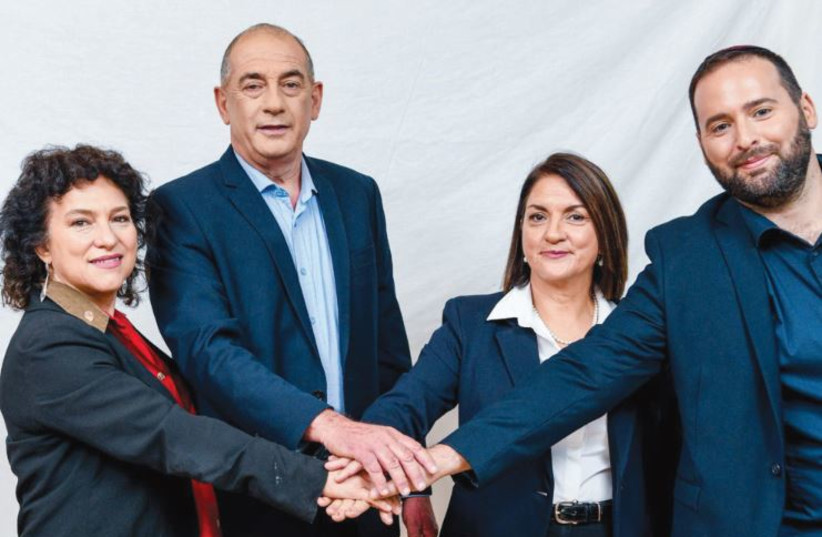
Laura Wharton is no stranger to advocating for equality, accessibility, and fairness in the capital.
A longtime city council member, Wharton’s journey started from her birthplace of New Jersey to Harvard University, followed by her move to Israel about 40 years ago. She has served as a lone soldier and lived on a kibbutz before relocating to Jerusalem.
Ahead of the municipal elections, In Jerusalem sat down with Wharton and discussed her positions and goals she hopes to advance as part of Yossi Havilio’s Jerusalem Union.
How did you get into Jerusalem municipal politics?
I got into municipal politics because of the public housing bill promoted by Ran Cohen of Meretz. I joined and we managed to pass it, and they suggested I run for city council. I’ve been here ever since.
What work have you done on the city council?
I held Jerusalem’s first portfolio for the advancement of people with disabilities and started the city’s accessibility department. I held a portfolio for the elderly and for public health, where I worked with veterinarian services regarding stray cats.

Now I hold the portfolio for the advancement of women. We worked to make sure there were women on every neighborhood council in Jerusalem. For what I think is the first time in Israeli history, there are three haredi women elected to neighborhood councils. When we passed this in the committee, I told the haredi representatives: ‘Listen, you have to have women; so if you don’t put your [haredi] women in, we’ll put other women in.’
We also started a unit to deal with domestic violence, and we worked on a new program to have more streets named after women.
[Jerusalem Union party leader and mayoral candidate] Yossi Havilio and I also spend a lot of time narrowing social gaps, trying to improve conditions, and education and basic infrastructure. A lot of money is invested in the city center to make it attractive for tourists, but we wanted to make sure all Jerusalemites were looked after.
I also worked with the residents of my neighborhood, Beit Hakerem, to get a home for lone soldiers. Now we have 60 lone soldiers being taken care of.
How did you get on a list with Yossi Havilio?
We decided with other representatives to form one party. We’re hoping to form a bloc on the council so we can balance things out and make sure Jerusalem meets the needs of all residents, not just haredi parties who have garnered a political majority without a demographic majority.
We’re leading a battle for Jerusalem’s character so that it continues to be a liberal and pluralist city that takes responsibility for all its residents.
Some call the Jerusalem Union an ‘anti-haredi alliance.’ How do you respond to that?
We have religious and secular representatives, all in favor of religious pluralism. We just object to unfair allocation of resources.
Here is a good example: We found that the city started financing buses for haredi girls living in Kiryat Hayovel. All kinds of people live there, and it’s unfair that only haredi girls should get this. The Education Ministry says that anyone who lives more than three kilometers from school should get busing, but they’re getting transportation for just a kilometer and a half. The city is giving haredim above and beyond what the law requires.
We’re not against haredim. I ran workshops to help ultra-Orthodox women read and understand their salary slips so they would know their rights, and I fought to give haredi children in Musrara a playground because they didn’t have one. I’m just against the narrow interests of some of the politicians who demand, and get, more than their fair share.
Jerusalem has seen a lot of construction that some say is excessive. What do you think?
This is one of the key points of our disagreements with Mayor Moshe Lion. I think the city is basing its building plans on faulty estimates for population growth. Even if it were to grow at the rate they expect, it shouldn’t be happening so quickly.
The objections of residents should be taken into account, and the historical view should be preserved. The swiftness causes traffic jams, and some construction is done without concern for infrastructure.
They’re also not building enough schools and community centers because they seem to be giving in to greedy contractors who just want to build apartments to sell and make more money.
There’s one terrible plan we’re trying to fight that they’re calling the Burj Khalifa, where they want to build a 42-story building on Epstein Street right by Mount Herzl.
Do you think the city should prioritize more bomb shelters?
This is actually a pet subject of mine. There’s a terrible lack of bomb shelters throughout the city. East Jerusalem has just one, and many public ones were found to have a lot of maintenance problems.
In addition, our comptroller said Jerusalem is very unprepared for emergencies like earthquakes and is spending less than 1% of its budget on preparedness.
We want to make sure this is taken care of.
Do you think there will ever be a female mayor?
Despite the extremism against women that gets a lot of press, I think Jerusalem women are incredibly strong. I believe in progress, and I think a woman in the mayor’s office would be another great sign. ■
